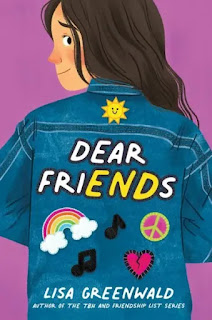At a loss to explain what is happening, Leni starts a "Friendship Fact-Finding Mission" (FFFM) to uncover why all of friendships have become friENDships. What she finds is a variety of life lessons ranging from the fact that people change to the realization that she is not always a good friend herself. She learns to let go of the notion that one must have a "best" friend and instead to embrace having a variety of relationships to enrich her life. Finally, while she can repair some of her past relationships, some of them have to be let go.
This is, in other words, the ultimate middle grade friendship book (a subject that is almost unfailingly coded as a "girls' book" since only girls apparently have friendships) in all of its ugly drama. It is exclusively focused on who is friends with whom, who is getting invited to whose parties, who wants to sit with whom, and what others are saying. Greenwald has a great ear for the age group and the book will be quite relatable to young people. The book really shines though for two reasons.
The first reason is having a really brave and articulate young heroine. While Leni's worries can be excruciatingly excessive, but she is also capable of taking action to fix things, showing initiative and displaying proactive interpersonal skills (certainly outshining her disturbingly codependent mother!). By the book's end, she not only identifies her issues, but also tackles them as well, reaching out to former friends and bravely initiating honest and painful conversations with them about where things went wrong.
The second reason I liked this book was the excellent advice unobtrusively delivered in the context of the story and helpfully summarized at the end of the book. There are plenty of non-fiction books for tween girls about friendships that parents can foist on them but it's much more fun to learn this from a fictional character who feels like she might go to your school. I know grownups will look on a book like this book with a combination of revulsion and condescension (who would ever want to relive the hell that was sixth grade?) but there's decent advice in here for adults too. So, maybe some child will pick up this book and suggest it to her/his mother to read and make a difference in both of their lives? You're never too old to learn some ways to make better friends.


No comments:
Post a Comment